- Home
- Elizabeth George
Missing Joseph il-6 Page 5
Missing Joseph il-6 Read online
Page 5
For she was a long time, long ago sinner. Skyclad in the cold of winter, in the balmy nights of summer, in the spring and fall, she had cast the circle. She had faced the altar north. Placing the candles at the circle’s four gates and using the water, the salt, and the herbs, she created a holy, magical cosmos from which she could pray. All the elements were there: the water, the air, the fire, the earth. The cord snaked round her thigh. The wand felt strong and sure in her hand. She used cloves for the incense and laurel for the wood and she gave herself — heart and soul, she declared — to the Rite of the Sun. For health and vitality. Praying for hope where the doctors had said there was none. Asking for healing when all they promised was morphine for the pain until death finally closed all.
Lit by the candles and the burning laurel’s flame, she had chanted the petition to Those whose presence she had earnestly invoked:
Annie’s health restor-ed be. God and Goddess grant my plea.
And she had told herself — convinced herself utterly — that her every intention was wholesome and pure. She prayed for Annie, her friend from childhood, sweet Annie Shepherd, darling Colin’s own wife. But only the spotless could call upon the Goddess and expect response. The magic of those who made the petition had to be pure.
Impulsively, Polly traced her steps back to the church and entered the graveyard. It was as black as the inside of the Horned God’s mouth, but she needed no light to show her the way. Nor did she need it to read the stone. ANNE ALICE SHEPHERD. And beneath it the dates and the words Dearest Wife. There was nothing more and nothing fancy, for more and fancy were not Colin’s way.
“Oh Annie,” Polly said to the stone that stood in the even deeper shadows where the wall of the yard skirted round a thick-branched chestnut tree. “It’s come upon me three-fold like the Rede says it would. But I swear to you, Annie, I never meant you harm.”
Yet even as she swore, the doubts were upon her. Like a plague of locusts, they laid her conscience bare. They exposed the worst of what she had been, a woman who wanted someone’s husband for her own.
“You did what you could, Polly,” Mr. Sage had told her, covering her hand with his own large mitt. “No one can truly pray away cancer. One can pray that the doctors have the wisdom to help. Or that the patient develops the strength to endure. Or that the family learns to cope with the sorrow. But the disease itself…No, dear Polly, one can’t pray away that.”
The vicar had meant well, but he didn’t really know her. He wasn’t the sort who could comprehend her sins. There was no absolution saying go in peace for what she had longed for in the foulest part of her heart.
Now she paid the three-fold price of having invited upon herself the wrath of the Gods. But it wasn’t cancer that they sent to affl ict her. It was a finer vengeance than Hammurabi could ever have wrought.
“I’d trade places with you, Annie,” Polly whispered. “I would. I would.”
“Polly?” A low, disembodied whisper in return.
She jumped back from the grave, her hand at her mouth. A rush of blood beat against her eyes.
“Polly? Is that you?”
Footsteps crunched just beyond the wall, gumboots snapping on the icy dead leaves that lay on the ground. She saw him then, a shadow among shadows. She smelled the pipe smoke that clung to his clothes.
“Brendan?” She didn’t need to wait for confirmation. What little light there was shone itself on Brendan Power’s beak of a nose. No one else in Winslough had a profile to match it. “What’re you doing out here?”
He seemed to read in the question an implicit and unintended invitation. He vaulted the wall. She stepped away. He approached her eagerly. She could see he held his pipe in his hand.
“I’ve been out to the Hall.” He tapped the pipebowl against Annie’s gravestone, dislodging burnt tobacco like ebony freckles on the frozen skin of the grave. He appeared to realise the impropriety of what he had done in the very next instant, because he said, “Oh. Damn. Sorry,” and he squatted and brushed the tobacco away. He stood, buried the pipe in his pocket, and shuffled his feet. “I was walking back to the village on the footpath. I saw someone in the graveyard, and I—” He lowered his head and seemed to be studying the barely discernible tops of his black gumboots. “I hoped it was you, Polly.”
“How’s your wife?” she asked.
He raised his head. “The renovation at the Hall’s been tampered with again. A bathroom tap left on. Some carpet’s got ruined. Rebecca’s worked herself into a state.”
“Understandable, isn’t it?” Polly said. “She wants a home of her own. It can’t be easy, living at her mum and dad’s, with a baby on the way.”
“No,” he said. “It’s not easy. For anyone. Polly.”
At the warmth of his tone, she looked away, in the distant direction of Cotes Hall where for the last four months a team of decorators and craftsmen had been pounding away at the long-abandoned Victorian structure, attempting to ready it for Brendan and his wife. “I can’t think why he doesn’t arrange for a night watchman.”
“He won’t be bullied into a watchman, he says. He’s got Mrs. Spence right on the grounds. He’s paying her to be there. And by God she ought to be bloody enough. Or so he says.”
“And does—” She worked at saying the name and betraying nothing as she said it. “Does Missus Spence never hear any mischief being made?”
“Not from her cottage. It’s too far behind the Hall, she says. And when she makes rounds, no one’s ever there.”
“Ah.”
They were silent. Brendan shifted his weight. Icy soil crackled beneath him. A gust of night wind soughed through the chestnut’s branches and blew at the back of Polly’s hair where the scarf couldn’t manage to hold it in place.
“Polly.”
She heard both the urgency and the plea in his voice. She’d seen them before on his face when he asked to join her at her table in the pub, appearing as if with preternatural knowledge of her movements each time she went to Crofters Inn for a drink. Now, as on those other occasions, she felt her stomach knot and her limbs grow cold.
She knew what he wanted. It was no different from what everyone wanted: rescue, escape, a secret to cling to, a half-formed dream. What did it matter to him if she was hurt in the process? On what account book was ever written the payment exacted for damage to a soul?
You’re married, Brendan, she wanted to say in a tone that combined both patience and compassion. Even if I loved you — which I don’t, you know — you’ve got a wife. Go on home to her now. Climb into bed and make love to Rebecca. You were willing enough to do that at one time.
But she was cursed with being a woman not naturally given to either rejection or cruelty. So instead, she said only, “I’ll be off now, Brendan. My mum’s waiting supper,” and she headed out the way she had come.
She heard him following. He said, “I’ll walk with you. You shouldn’t be out here alone.”
“It’s too far,” she said. “And you’ve just come that way, haven’t you?”
“But on the footpath,” he said with an assurance suggesting he believed his answer was the height of logic. “Across the meadow. Over the walls. I didn’t walk along the road.” He matched his steps to hers. “I’ve got a torch,” he added, pulling it out of his pocket.
“You shouldn’t be walking at night without a torch.”
“It’s only a mile, Brendan. I can cope with that.”
“So can I.”
She sighed. She wanted to explain that he couldn’t simply take a walk with her in the dark. People would see them. They’d misunderstand.
But she knew in advance how he would respond to her explanation. They’ll just think I’m walking to the Hall, he’d answer, I go out there every day.
What an innocent he was. How imperfect was his understanding of village life. It would matter little to anyone who saw them that Polly and her mother had lived twenty years in the gabled lodge at the mouth of the drive that led to Cotes Hall.
No one would stop to think of that, or to think that Brendan was checking on the Hall’s renovation in anticipation of moving there with his bride. Assignation by night, the villagers would label it. Rebecca would hear of it. There’d be hell to pay.
Not that Brendan wasn’t paying already. Polly had little doubt of that. She’d seen enough of Rebecca Townley-Young throughout their lives to know that marriage to her under the best of conditions would not be a particularly nurturing affair.
So among other things, she felt sorry for Brendan which is why she allowed him to join her at Crofters Inn in the evening, which is why she now just kept walking along the verge, with her eyes fastened on the steady, bright beam from Brendan’s torch. She didn’t attempt to make conversation. She had a fairly good idea where any conversation with Brendan Power would ultimately lead.
A quarter of a mile along, she slipped on a stone, and Brendan took her arm.
“Careful,” he said.
She could feel the back of his fi ngers pressing against her breast. With each of her footsteps, the fingers rose and fell, acting the part of distant cousin to caress.
She shrugged, hoping to disengage his hand. His grip grew fi rmer.
“It was Craigie Stockwell,” Brendan said diffidently into the growing silence between them.
She drew her eyebrows together. “Craigie what?”
“The carpet at the Hall. Craigie Stockwell. From London. It’s a ruin now. The drain in the basin was plugged with a rag. Friday night, I should guess. It looked as if the water had run all weekend.”
“And no one knew?”
“We’d gone down to Manchester.”
“Doesn’t anyone go inside when the workmen aren’t there? Check things’re in order?”
“Mrs. Spence, you mean?” He shook his head. “She generally just checks the windows and doors.”
“But isn’t she supposed to be—”
“She’s a caretaker. Not a security guard. And I imagine she’s nervous out there alone. Without a man, I mean. It’s a lonely spot.”
But she’d frightened off intruders at least once, Polly knew. She’d heard the shotgun herself. And then a few minutes later came the thudding of two or three frantic, shouting runners, and the gunning of a motorbike afterwards. The word went out to the village after that. People didn’t mess Juliet Spence about.
Polly shivered. The wind was rising. It blew in brief, frigid gusts through the bare hawthorn hedge that bordered the road. It promised a heavier frost in the morning.
“You’re cold,” Brendan said.
“No.”
“You’re shivering, Polly. Here.” He put his arm round her and drew her snugly next to him. “Better, isn’t it?” She didn’t reply. “We walk together at the same pace, don’t we? Have you noticed that? But if you put your arm round my waist, it’s even easier going.”
“Brendan.”
“You haven’t been to the pub this week. Why?”
She didn’t respond. She moved her shoulders. His grip remained fi rm.
“Polly, have you been up Cotes Fell?”
She felt the cold on her cheeks. It insinuated itself like tentacles down her neck. Ah, she thought, here it comes at last. Because he’d seen her there one evening last autumn. He’d heard her petition. He knew the worst.
But he went on easily. “I find I like hiking more and more every week. I’ve been out to the reservoir three times, you know. I’ve done a long tramp through the Trough of Bowland and another near Claughton, up Beacon Fell. The air smells so fresh. Have you noticed that? When you reach the top? But then, I suppose you’re too busy to do much walking.”
Now he’ll say it, she thought. Now comes the price I’ll have to pay him to hold his tongue.
“With all the men in your life.”
The allusion was a puzzle.
He shot her a glance. “There must be men. Lots, I’d guess. That’s probably why you’ve not been in the pub. Busy, aren’t you? Dating, I mean. Someone special, no doubt.”
Someone special. Without consideration, Polly gave a weary chuckle.
“There is someone, isn’t there? A woman like you. I mean. I can’t imagine a bloke who wouldn’t. Given half a chance. I would. You’re terrific. Anyone can see that.”
He switched off the torch and put it in his pocket. Freed, his other hand grasped her arm.
“You look so good, Polly,” he said and bent closer. “You smell good. You feel good. Chap doesn’t see that needs his head examined.”
His steps slowed then stopped. There was reason for this, she told herself. They had reached the drive at one side of which sat the lodge where she lived. But then he turned her to him.
“Polly,” he said urgently. He caressed her cheek. “I feel so much for you. I know you’ve seen it. Won’t you please let me—”
A car’s headlamps caught them like rabbits in its beam, not coming along the Clitheroe Road but bumping and jolting along the lane that led beyond the lodge up to Cotes Hall. And just like rabbits, they froze in position, Brendan’s one hand on Polly’s cheek, his other on her arm. There could be no real mistaking his intentions.
“Brendan!” Polly said.
He dropped his hands and put a careful two feet between them. But it was too late. The car came upon them slowly, then slowed even more. It was an old green Land Rover, mud-spattered and grimy, but its windscreen and windows were perfectly clean.
Polly turned her head away from the sight of it, not so much because she didn’t want to be seen and gossipped over — she knew that nothing would spare her that — but so she wouldn’t have to see the driver or the woman next to him with her blunt greying hair and her angular face and, Polly could see it all so vividly without even trying, with her arm stretched out so that the tips of her fi ngers rested on the back of the driver’s neck. Touching and twining through that slicked-back, undisciplined, ginger hair.
Colin Shepherd and Missus Spence were having another lovely evening together. The Gods were reminding Polly Yarkin of her sins.
Damn the air and the wind, Polly thought. There was no justice. No matter what she did, it came out wrong. She slammed the door behind her and drove her fist into it once.
“Polly? That you, luv-doll?”
She heard the roll of her mother’s heavy footsteps trundling across the sitting room floor. The sound of wheezing accompanied this, as did the clink and clatter of jewellery— chains, necklaces, gold doubloons, and anything else her mother saw fit to deck herself out with when she made her wintertime morning toilette.
“Me, Rita,” Polly answered. “Who else?”
“I dunno, luv. Some good-looking chappie with a sausage to share? Got to keep yourself open to the unexpected. ’At’s my motto, that is.” Rita laughed and wheezed. Her scent preceded her like an olfactory harbinger. Giorgio. She sprayed it on by the tablespoon. She came to the door of the sitting room and filled it, so large a woman that she ballooned out in a shapeless mass from her neck to her knees. She leaned against the jamb, working hard to catch her breath. The entry light glistened against the necklaces on her massive chest. It cast a grotesque Rita-shadow on the wall and made a fleshy beard of one of her chins.
Polly squatted to unlace her boots. They were thick-soled with mud, a fact that did not escape her mother.
“Where you been, luv-doll?” Rita jingle-jangled one of her necklaces, an affair of large cat heads fashioned in brass. “You go for a hike?”
“Road’s muddy,” Polly said with a grunt as she forced off one boot and worked on the other. Their laces were sodden, and her fi ngers were stiff. “Wintertime. You forget what it’s like?”
“Wish I could, I do,” her mother said. “So how’s things in the metropolis today?”
She pronounced it metro-POH-lis. Deliberately. It was part of her persona. She wore a guise of spurious ignorance while in the village, an extension of the general style she adopted when she came home for her winters in Winslough. Spring, autumn, and summer, she was
Rita Rularski, reader of tarot, thrown stones, and palms. From her shopfront in Blackpool, she foresaw the future, expounded on the past, and made sense of the troubled, fractious present for anyone willing to part with the cash. Residents, tourists, holiday-makers, curious housewives, fine ladies looking for a giggle and a thrill, Rita saw them all with equal aplomb, dressed in a kaftan big enough to fit an elephant, with a bright scarf covering her grizzled brambles of hair.
But in winter she became Rita Yarkin again, back in Winslough for a three-month stay with her only child. She put her hand-painted sign on the verge of the road and waited for custom which seldom developed. She read magazines and watched the telly. She ate like a docker and painted her nails.
Polly glanced at these curiously. Purple today, with a tiny strip of gold crossing each one diagonally. They clashed with her kaftan — it was pumpkin orange — but they were a decided improvement over yesterday’s yellow.
“You tiff with someone this evenin’, luvdoll?” Rita asked. “You got an aura shrivelled to nothing, you do. That a’nt good, is it? Here. Lemme take a look at your face.”
“It’s nothing.” Polly made herself busier than she needed to be. She banged her boots against the inside of the woodbox next to the door. She took off her scarf and folded it neatly into a square. She put this square in the pocket of her coat and then brushed the coat itself with the flat of her hand, removing both speckles of lint and nonexistent splatters of mud.
Her mother wasn’t to be easily sidetracked. She pushed her huge mass from the door-jamb. She waddled to Polly and turned her round. She peered at her face. With her hand palm-open and an inch away, she traced the shape of Polly’s head and her shoulders.
“I see.” She pursed her lips and dropped her arm with a sigh. “Stars and earth, girl, stop being such a fool.”

 Well-Schooled in Murder
Well-Schooled in Murder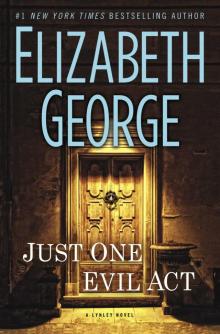 Just One Evil Act
Just One Evil Act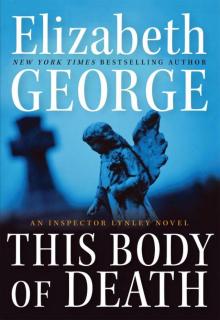 This Body of Death
This Body of Death The Edge of the Water
The Edge of the Water For the Sake of Elena
For the Sake of Elena Believing the Lie
Believing the Lie The Edge of the Shadows
The Edge of the Shadows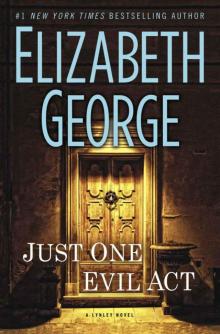 Just One Evil Act: A Lynley Novel
Just One Evil Act: A Lynley Novel In Pursuit of the Proper Sinner
In Pursuit of the Proper Sinner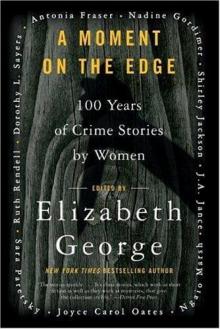 A Moment on the Edge:100 Years of Crime Stories by women
A Moment on the Edge:100 Years of Crime Stories by women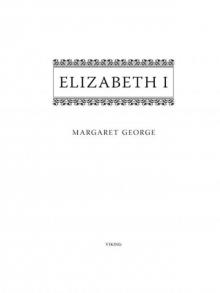 Elizabeth I
Elizabeth I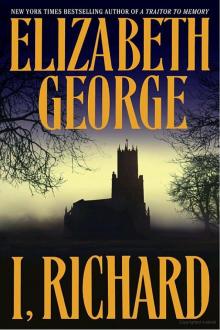 I, Richard
I, Richard A Traitor to Memory
A Traitor to Memory Missing Joseph
Missing Joseph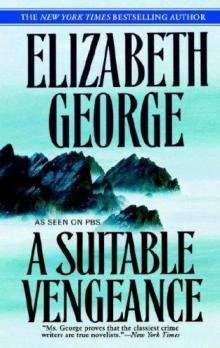 A Suitable Vengeance
A Suitable Vengeance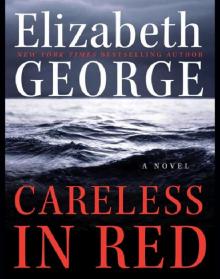 Careless in Red
Careless in Red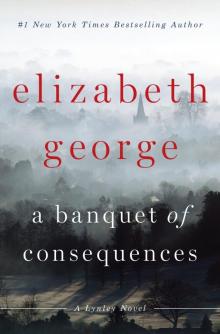 A Banquet of Consequences
A Banquet of Consequences Playing for the Ashes
Playing for the Ashes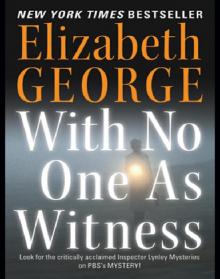 With No One As Witness
With No One As Witness Deception on His Mind
Deception on His Mind The Best American Mystery Stories 2016
The Best American Mystery Stories 2016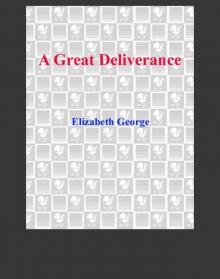 A Great Deliverance
A Great Deliverance In the Presence of the Enemy
In the Presence of the Enemy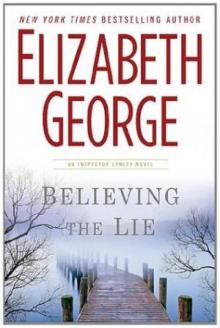 Believing the Lie il-17
Believing the Lie il-17 The Edge of the Light
The Edge of the Light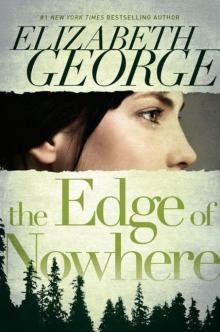 SW01 - The Edge of Nowhere
SW01 - The Edge of Nowhere A Place of Hiding
A Place of Hiding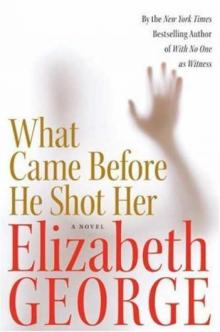 What Came Before He Shot Her il-14
What Came Before He Shot Her il-14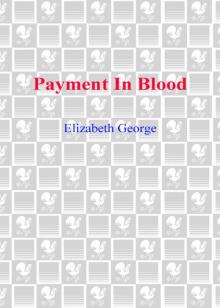 Payment In Blood
Payment In Blood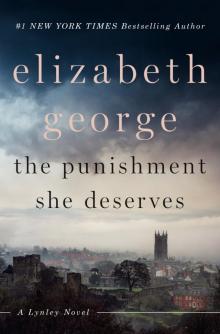 The Punishment She Deserves
The Punishment She Deserves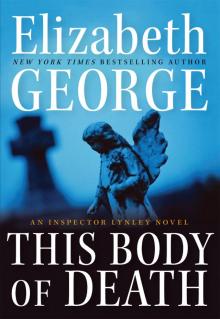 This Body of Death: An Inspector Lynley Novel
This Body of Death: An Inspector Lynley Novel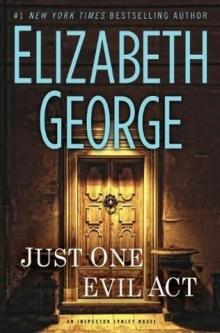 Just One Evil Act il-18
Just One Evil Act il-18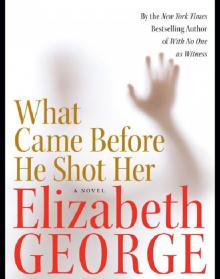 What Came Before He Shot Her
What Came Before He Shot Her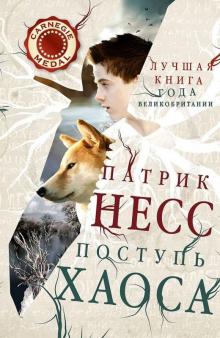 Missing Joseph il-6
Missing Joseph il-6